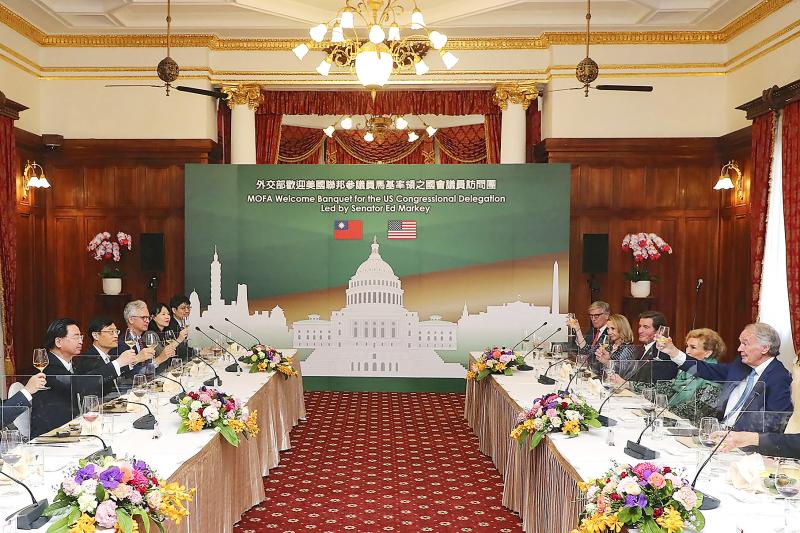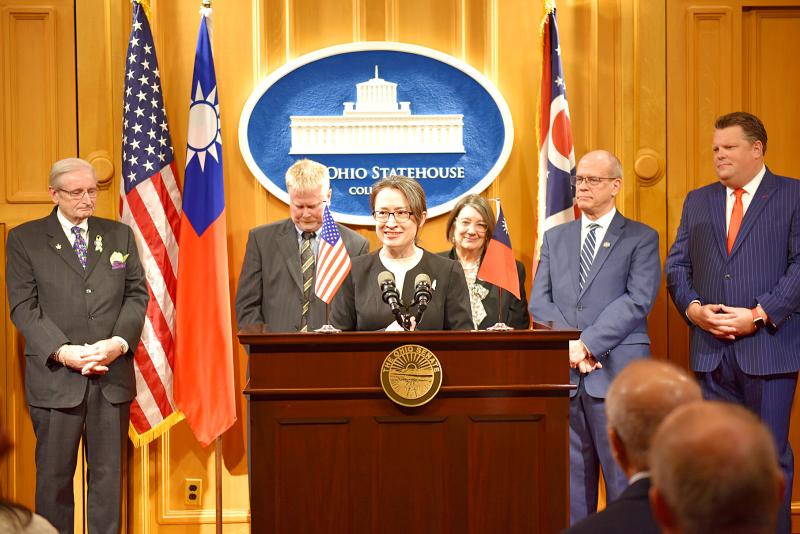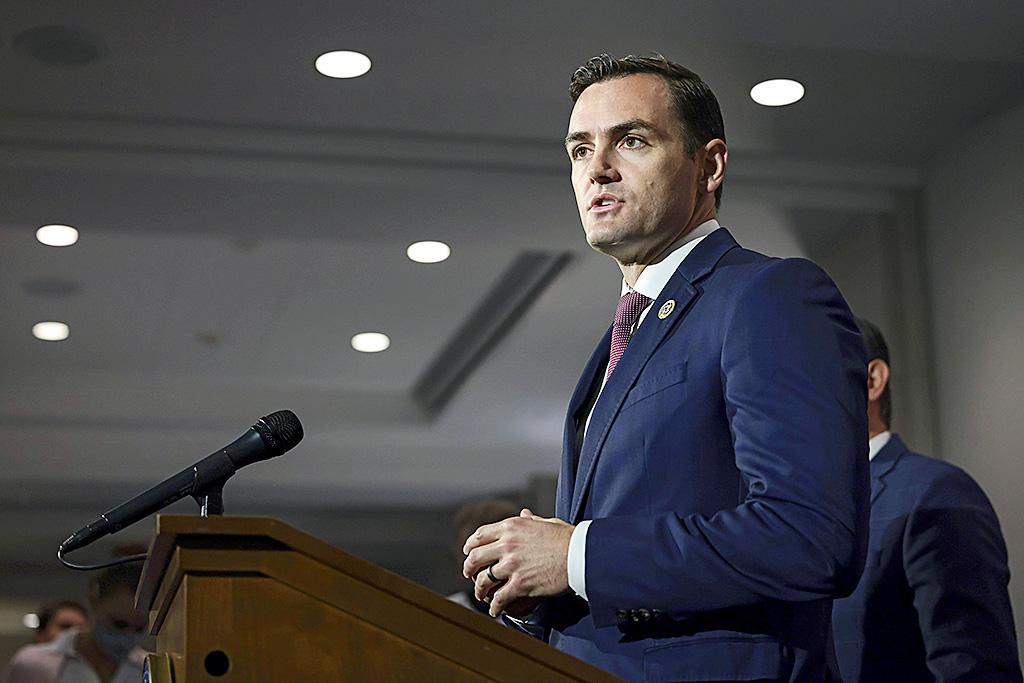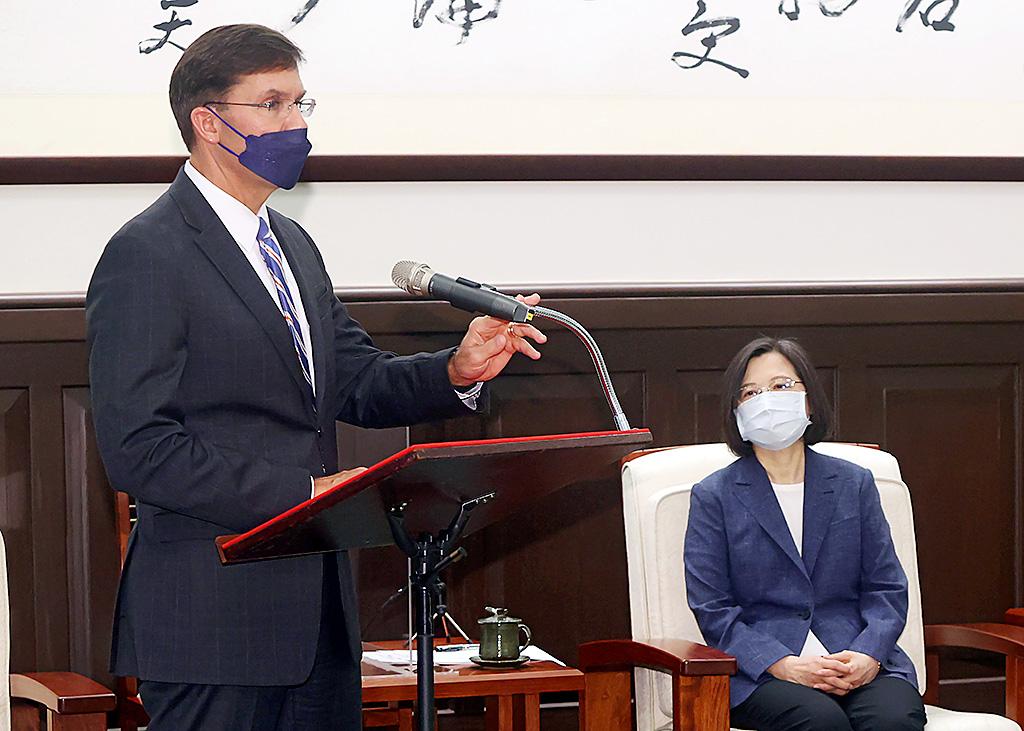In case anyone was still wondering, US policy on Taiwan’s status is simple: the status of Taiwan is unresolved. It’s been that way since April 28, 1952, when the San Francisco Peace Treaty came into effect and Japan terminated its formal sovereignty over Taiwan. Since the treaty does not award that sovereignty to any power, it remains unresolved in international law. The US thus “acknowledges” but does not “recognize” China’s claim. This policy is followed by other nations, including Canada, the UK, Australia, New Zealand and Japan.
US policy on Taiwan’s status may be simple, but it remains concealed behind walls of verbiage that make the US tax code look like a miracle of clarity, a piece of catechism known only to the initiated. The cognoscenti may enjoy their insider knowledge, but it doesn’t help Taiwan.
It’s time for the US to clearly state its policy to the global and American public.

Photo: AP
HELPING BEIJING
The first reason it should do this is obvious from any survey of commentary on Taiwan, China and the US: US concealment of its Taiwan policy is helping Beijing.
A range of recent commentary from across the political spectrum, from Ed Luce in the Financial Times (“Nancy Pelosi’s reckless jaunt to Taiwan,” Jul 22, 2022) to Branko Marcetic in Jacobin (“Cable News Wants War With China Over Taiwan,” Aug 4, 2022), shows how Washington’s concealment of its Taiwan policy serves Beijing’s interests.

Photo: CNA
For example, if Washington were clear on its policy, Marcetic would not have been able to claim that Washington says Taiwan is part of China. Similarly, Luce could not have validated the lies of the Chinese ambassador to the US by saying “I found it hard to dispute [Qin Gang’s] (秦剛) view that America’s [“one China” policy] is being steadily eroded and ‘hollowed out’ in today’s Washington,” implying that Washington agrees with China on Taiwan’s status.
If Washington’s position were better known, the response from media workers to Chinese officials would eventually become automatic: “Yet, we do not recognize Taiwan as part of China.”
Erroneous representations of US Taiwan policy are common even in major media organizations, whose institutional memory often appears to be the inspiration for the movie Memento. Their constant reiteration helps advance Beijing’s claim to Taiwan and to support its “one China” principle.

Photo: AFP
Further, because Washington’s policy is nowhere clearly stated on US government Web sites or by US officials in regular ways, it is easy for people to confuse the meaning of the word “acknowledge” in US official framing of its policy.
Indeed, Beijing has exploited that recently, slyly editing an old video of President Jimmy Carter reading a statement that the US acknowledges China’s claim to Taiwan, making it appear that the US supports Beijing’s position. As Luce’s comments show, “acknowledge” also makes it easy for commentators to validate Beijing’s position, if they so desire.
Washington officialdom needs to clearly state the US position that it does not recognize China’s claim to Taiwan and then constantly repeat that. The use of the word “acknowledge” to represent Washington’s position must cease. Not only is it dangerously misleading, it also makes Washington look weak and confused.

Photo: CNA
DOMESTIC EXPLANATION
The second reason is domestic. At some point, the US is going to have to explain to its public why we are going to war over Taiwan, and why that war is soundly rooted in international law and the UN agreements (the Taiwanese have been robbed of a referendum on their fate), along with our treaty agreements with Japan and Philippines. Changing policies now would then result in reproductions of the real policy rippling naturally across the US media over the next few years.
Note that by repeating “acknowledge” and not “does not recognize” the US starves its Taiwan policy of the support it could receive by formally situating its view of Taiwan’s status within history and international law. Instead of the word salad one hears from US State Department spokesmen, the verbiage about the Taiwan Relations Act and the Six Assurances and the Three Communiques and the Nine Rings of Power and the Twelve Partridges in the Pear Tree and the Four Things You Should Never Do on a First Date, US officials could then be talking about the UN agreements on decolonization and rights of the people of Taiwan.
Imagine if, when asked “Who owns Taiwan?” US officials could honestly reply, “well, our policy is that the status of Taiwan remains unresolved. Thus, under international law and our policy, the people of Taiwan own Taiwan.”
A response-style framing for this is already available: China’s recently issued White Paper with its numerous changes to its Taiwan policy. China has announced that Taiwan will be occupied, removed assurances that pro-China parties such as the Chinese Nationalist Party (KMT) will be permitted to exist, removed the possibility of negotiations (signaling that annexation will be dictated from Beijing) and called for all forms of warfare (including lawfare and economic warfare) against Taiwan.
What could be better than the US announcing, in response to these changes, clarifications to its Taiwan policy?
TAKE THE LEAD
The third reason Washington needs to change its vocabulary is that other countries follow Washington’s lead and conceal their policies behind “acknowledge” and “take note of” statements about China’s claim. Washington taking the lead on this would eventually bring those other nations along. More open global recognition that Taiwan’s status under international law remains undetermined can only help Taiwan, by raising its support and enabling it to push back against China’s lawfare.
A firm and clear announcement from Washington would also force the global media to revise its presentations on Taiwan, especially on the left, where obfuscation is (often deliberately) rampant. I dream of the day when even BBC speaks truth on Taiwan (“Blundering the basics of China and Taiwan,” Taipei Times, Apr 19, 2021).
Moments such as Pink Floyd rocker Roger Waters pontificating about Taiwan and China in hilariously abject ignorance to CNN host Michael Smerconish (Aug 6, 2022) would then have an automatic counter, a frame of reference in which Taiwan’s status under international law would be widely known and Waters’ lack of knowledge obvious.
Disinformation is rampant, and US policy constantly misrepresented. Only Beijing benefits from US ambiguity. Time for the State Department to leave the 1970s and offer an honest position on Taiwan’s status.
Oh yeah, there is one other reason Washington needs to change: to spare us who comment on Taiwan the constant need to correct people on this.
Please, Washington. Have mercy on us.
Notes from Central Taiwan is a column written by long-term resident Michael Turton, who provides incisive commentary informed by three decades of living in and writing about his adoptive country. The views expressed here are his own.

Taiwan has next to no political engagement in Myanmar, either with the ruling military junta nor the dozens of armed groups who’ve in the last five years taken over around two-thirds of the nation’s territory in a sprawling, patchwork civil war. But early last month, the leader of one relatively minor Burmese revolutionary faction, General Nerdah Bomya, who is also an alleged war criminal, made a low key visit to Taipei, where he met with a member of President William Lai’s (賴清德) staff, a retired Taiwanese military official and several academics. “I feel like Taiwan is a good example of

March 2 to March 8 Gunfire rang out along the shore of the frontline island of Lieyu (烈嶼) on a foggy afternoon on March 7, 1987. By the time it was over, about 20 unarmed Vietnamese refugees — men, women, elderly and children — were dead. They were hastily buried, followed by decades of silence. Months later, opposition politicians and journalists tried to uncover what had happened, but conflicting accounts only deepened the confusion. One version suggested that government troops had mistakenly killed their own operatives attempting to return home from Vietnam. The military maintained that the

Jacques Poissant’s suffering stopped the day he asked his daughter if it would be “cowardly to ask to be helped to die.” The retired Canadian insurance adviser was 93, and “was wasting away” after a long battle with prostate cancer. “He no longer had any zest for life,” Josee Poissant said. Last year her mother made the same choice at 96 when she realized she would not be getting out of hospital. She died surrounded by her children and their partners listening to the music she loved. “She was at peace. She sang until she went to sleep.” Josee Poissant remembers it as a beautiful

Before the last section of the round-the-island railway was electrified, one old blue train still chugged back and forth between Pingtung County’s Fangliao (枋寮) and Taitung (台東) stations once a day. It was so slow, was so hot (it had no air conditioning) and covered such a short distance, that the low fare still failed to attract many riders. This relic of the past was finally retired when the South Link Line was fully electrified on Dec. 23, 2020. A wave of nostalgia surrounded the termination of the Ordinary Train service, as these train carriages had been in use for decades